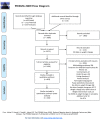Antipsychotics result in more weight gain in antipsychotic naive patients than in patients after antipsychotic switch and weight gain is irrespective of psychiatric diagnosis: A meta-analysis
- PMID: 33596211
- PMCID: PMC7888647
- DOI: 10.1371/journal.pone.0244944
Antipsychotics result in more weight gain in antipsychotic naive patients than in patients after antipsychotic switch and weight gain is irrespective of psychiatric diagnosis: A meta-analysis
Abstract
Introduction: Antipsychotics are associated with bodyweight gain and metabolic disturbance. Previous meta-analyses were limited to mainly antipsychotic switch studies in patients with a diagnosis of schizophrenia or psychosis with short follow-up periods. The present meta-analysis aimed to analyse the impact of weight change in antipsychotic-naive and antipsychotics switch patients and whether body weight change depended on diagnosis.
Method: We performed a meta-analysis of clinical trials of antipsychotics that reported weight change, irrespective of psychiatric diagnosis. Outcome measure was body weight change. Studies were classified into antipsychotic-naive and antipsychotic-switch. Forest plots stratified by antipsychotic and the duration of antipsychotic use were generated and results were summarised in figures.
Results: In total, 404 articles were included for the quantitative synthesis. 58 articles were on antipsychotic naive patients. In the antipsychotic naive group, all antipsychotics resulted in body weight gain. In the antipsychotic switch group, most antipsychotics likewise resulted in bodyweight gain, with exception of amisulpride, aripiprazole and ziprasidone that showed no body weight gain or even some weight loss after switching antipsychotics. Diagnosis was not a discriminating factor of antipsychotic induced weight change.
Conclusion: Antipsychotic use resulted in substantial increase in body weight in antipsychotic-naive patients. In antipsychotic-switch patients the weight gain was mild and not present in amisulpride, aripiprazole and ziprasidone. In both groups, weight gain was irrespective of the psychiatric diagnosis.
Conflict of interest statement
The authors have declared that no competing interests exist.
Figures



Similar articles
-
Almost all antipsychotics result in weight gain: a meta-analysis.PLoS One. 2014 Apr 24;9(4):e94112. doi: 10.1371/journal.pone.0094112. eCollection 2014. PLoS One. 2014. PMID: 24763306 Free PMC article.
-
Does Switching Antipsychotics Ameliorate Weight Gain in Patients With Severe Mental Illness? A Systematic Review and Meta-analysis.Schizophr Bull. 2021 Jul 8;47(4):948-958. doi: 10.1093/schbul/sbaa191. Schizophr Bull. 2021. PMID: 33547471 Free PMC article.
-
A new genetic locus for antipsychotic-induced weight gain: A genome-wide study of first-episode psychosis patients using amisulpride (from the OPTiMiSE cohort).J Psychopharmacol. 2020 May;34(5):524-531. doi: 10.1177/0269881120907972. Epub 2020 Mar 4. J Psychopharmacol. 2020. PMID: 32126890 Free PMC article.
-
Second-generation (atypical) antipsychotics and metabolic effects: a comprehensive literature review.CNS Drugs. 2005;19 Suppl 1:1-93. doi: 10.2165/00023210-200519001-00001. CNS Drugs. 2005. PMID: 15998156 Review.
-
Antipsychotic-induced weight gain and birth weight in psychosis: A fetal programming model.J Psychiatr Res. 2019 Aug;115:29-35. doi: 10.1016/j.jpsychires.2019.05.004. Epub 2019 May 4. J Psychiatr Res. 2019. PMID: 31085376 Clinical Trial.
Cited by
-
Experiences and perceptions of people with a severe mental illness and health care professionals of a one-year group-based lifestyle programme (SMILE).PLoS One. 2022 Aug 4;17(8):e0271990. doi: 10.1371/journal.pone.0271990. eCollection 2022. PLoS One. 2022. PMID: 35925975 Free PMC article.
-
Twenty-Four Week, Randomized, Double-Blind, Placebo-Controlled Trial of Metformin for Antipsychotic-Induced Weight Gain in Patients with First-Episode Psychosis: A Pilot Study.Int J Environ Res Public Health. 2021 Dec 23;19(1):137. doi: 10.3390/ijerph19010137. Int J Environ Res Public Health. 2021. PMID: 35010394 Free PMC article. Clinical Trial.
-
Biological Mechanism(s) Underpinning the Association between Antipsychotic Drugs and Weight Gain.J Clin Med. 2021 Sep 10;10(18):4095. doi: 10.3390/jcm10184095. J Clin Med. 2021. PMID: 34575210 Free PMC article.
-
Weight change following diagnosis with psychosis: a retrospective cohort study in Greater Manchester, UK.Ann Gen Psychiatry. 2024 Jan 3;23(1):1. doi: 10.1186/s12991-023-00485-8. Ann Gen Psychiatry. 2024. PMID: 38172807 Free PMC article.
-
A retrospective database study on 2-year weight trajectories in first-episode psychosis.Front Psychiatry. 2023 Jun 27;14:1185874. doi: 10.3389/fpsyt.2023.1185874. eCollection 2023. Front Psychiatry. 2023. PMID: 37476538 Free PMC article.
References
-
- Correll CU, Solmi M, Veronese N, Bortolato B, Rosson S, Santonastaso P, et al. Prevalence, incidence and mortality from cardiovascular disease in patients with pooled and specific severe mental illness: a large-scale meta-analysis of 3,211,768 patients and 113,383,368 controls. World Psychiatry. 2017;16(2):163–80. 10.1002/wps.20420 - DOI - PMC - PubMed
-
- Eckel N, Li Y, Kuxhaus O, Stefan N, Hu FB, Schulze MB. Transition from metabolic healthy to unhealthy phenotypes and association with cardiovascular disease risk across BMI categories in 90 257 women (the Nurses’ Health Study): 30 year follow-up from a prospective cohort study. Lancet Diabetes Endocrinol. 2018. 10.1016/S2213-8587(18)30137-2 - DOI - PubMed
Publication types
MeSH terms
Substances
LinkOut - more resources
Full Text Sources
Other Literature Sources
Medical

